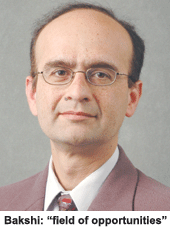 Prof. Bhavik R. Bakshi is the new vice chancellor of the Delhi-based The Energy and Resources Institute (TERI) University, India’s premier environment studies institution. A chemical engineering graduate of Bombay University with a Ph D from the renowned Massachusetts Institute of Technology, Cambridge (USA), Bakshi was formerly a distinguished research scientist and professor of chemical engineering at Ohio State University, USA and visiting faculty with several institutions in the US and India, including the Institute of Chemical Technology, Mumbai.
Prof. Bhavik R. Bakshi is the new vice chancellor of the Delhi-based The Energy and Resources Institute (TERI) University, India’s premier environment studies institution. A chemical engineering graduate of Bombay University with a Ph D from the renowned Massachusetts Institute of Technology, Cambridge (USA), Bakshi was formerly a distinguished research scientist and professor of chemical engineering at Ohio State University, USA and visiting faculty with several institutions in the US and India, including the Institute of Chemical Technology, Mumbai.
“I feel I am standing before a field of opportunities, with challenges blocking their harvest. The need for solutions that TERI University is pioneering is urgent and essential to meet the challenges of sustainability. Among the critical challenges from the university’s point of view are: maintaining existing and developing new high-quality research and education programmes with multidisciplinary orientation directed towards sustainable develop-ment; attracting motivated students and professionals for higher education and Ph D-level research, and building an institutional environment that encou-rages creativity and innovation within faculty and students. In terms of priorities, attracting the best students especially for doctorate research is the most important. This requires providing excellent infrastructure and building a research culture in TERI. It is also very important to educate our stakeholders — industry, government and civil society — about the need for the type of education we are providing,” says Bakshi.
With a distinguished record of teaching and research in India and the US, during which time he has authored over 100 peer-reviewed publications in the areas of sustainability, science and engineering, process systems engine-ering, complex and multiscale systems, industrial ecology and applied statistics, Bakshi brings a wealth of science and environmental knowledge to TERI.
“The environmental challenges confronting India and the world cannot be solved by traditional learning and research pedagogies as they extend across temporal, spatial and disciplinary boundaries. For example, engineering initiatives for improving energy effici-ency are also expected to reduce pollu-tion and energy consumption. However, this need not happen as the money saved by consumers because of higher efficiency of appliances often gets used for activities that consume even more energy. Thus, an engineering solution often creates a consumerism problem. Therefore multidisciplinary education and research are essential to address the challenges of sustainable economic development. Yet there are hardly any study programmes offering multidisci-plinary opportunities,” he says.
Bakshi readily admits that the decision to return to India was far from easy, but he expects to make harder decisions in the near future. “In the process of developing TERI University I will re-start my own research activities in sustain-ability, science and engineering and simultaneously develop a group of Masters and Ph D students who under-stand the challenges of sustainable economic development within the university. I believe the work we will do in TERI over the next few years will have profound implications for future growth and development of the Indian economy,” says Bakshi.
Wind energy in your sails!
Autar Nehru (Delhi)